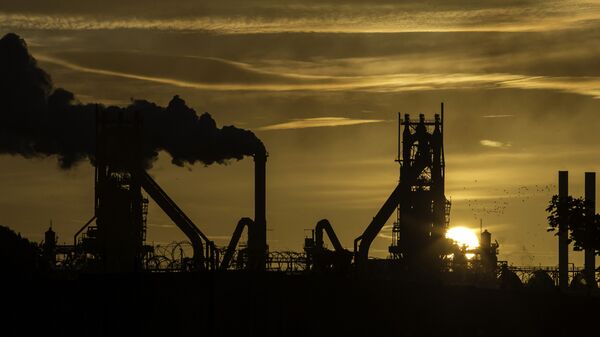The Brexit Party claims British Steel — which was placed in compulsory liquidation on Wednesday 22 May — could have been saved with state aid if the UK had withdrawn from the European Union on 29 March, as was originally envisaged.
The government's Official Receiver took over the business and said 20,000 in British Steel's supply chain were at risk if it could not find a buyer.
Richard Tice, an entrepreneur and chairman of Nigel Farage's Brexit Party, said: "If we had left the European Union on 29 March then the government could have swept in and saved an industry of strategic national importance."
— William Clouston SDP (@WilliamClouston) 22 May 2019
Mr Tice said: "This is one of the clear examples why it is vital that we leave the European Union so that our government with proper firm, robust leadership, can make economic decisions that are in the strategic national interest. We have been prevented from doing so under the European Union's state aid rules. It's an outrage and these jobs and this uncertainty is completely at the doorstep of this government for failing to leave the European Union on 29 March."
— Donald J. Trump (@realDonaldTrump) 14 May 2019
Under European Union rules it is illegal for EU countries to give financial help to a company like British Steel if it "would distort fair competition".
This help is called state aid, and the rules barring it are enforced by the European Commission.
France has frequently been accused of breaching state aid rules, but since the 1980s — when Margaret Thatcher introduced brutal new policies on "competitiveness" — successive British government have let UK companies go to the wall rather than prop them up with public money.
The UK steel industry has been in a slow decline since the 1970s and without state aid its demise would appear to be terminal.
— Neil Hamilton AC/AM (@NeilUKIP) 21 May 2019
In 1979 British Steel announced the closure of the Corby steelworks in Northamptonshire, with the loss of 10,000 jobs.
The following year Consett works in County Durham closed, with another 4,500 steel workers thrown into unemployment.
In 1992 Scotland's biggest steelworks, at Ravenscraig, was closed with the loss of 770 direct jobs and thousands more indirectly.
— Natalie Bell (@nbell186) 23 May 2019
The reason for these closures was that British steel was being undercut by cheaper steel imports from Germany, Belgium, Spain and other EU countries.
British Steel was privatised by Thatcher's government in 1988 and 11 years it merged with the Dutch firm Koninklijke Hoogovens to form Corus.
In the last decade the market has become even tougher as China dumped large amounts of cheap exports.
— Ted Flanagan (@Glanfordparker) 23 May 2019
Corus struggled and in 2007 it was bought by India's Tata Steel, but they too were unable to turn the company around in 2016 sold the Long Products Europe steel division to Greybull Capital, a private equity firm which was behind the wheel when Monarch Airlines crashed the following year.
But the China card can be exaggerated — in 2016 UK steel imports from China were only running at seven percent of the total.
The simple fact is that Greybull, like Tata Steel before them, were simply unable to stem the losses at British Steel.
— Jack Dromey MP (@JackDromeyMP) 21 May 2019
They were not alone.
In 2015 Sahaviriya Steel Industries UK closed its steelworks at Redcar in 2015.
British Steel currently employs 2,000 people at its Scunthorpe steelworks in the north of England and also produces steel on Teesside.
— Council on Foreign Relations (@CFR_org) 14 May 2019


